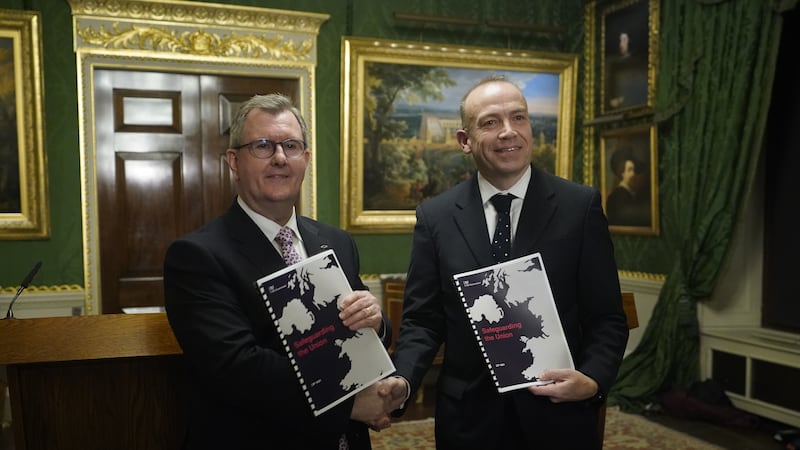Annex B of the command paper (Strengthening Northern Ireland’s Place In The Union) begins with an unambiguous statement: “The government is committed to strengthening Northern Ireland’s place in the union. We have been clear that we will never be neutral on this issue and note this is a position held on a broad, cross-party basis in parliament.”
It continues: “The recent political context has given rise to concerns about NI’s place in the union (and) the unionist community’s strong objections to the old NI Protocol… have all contributed to a sense that the parity of esteem on which the Belfast (Good Friday) Agreement was founded has been undermined.”
What the paper doesn’t mention is that it was the government, under Boris Johnson, which rammed through the protocol and then the government, under Rishi Sunak, which secured massive majorities for the Windsor Framework. The protocol and framework fuelled the narrative across unionism – and not just the elements which supported Brexit – that NI had been reduced to a hybrid constitutional status in which it was clearly no longer an integral part of the UK.

Jump back 34 years, to November 9 1990, when Secretary of State Peter Brooke told his constituency association that Britain had no selfish economic or strategic interest in NI. It was a comment which angered unionism and loyalism, with the leaders of the UUP and DUP using the term ‘neutral’ to describe what appeared to be a new policy by the government. The usual sources in the NIO and Downing Street dismissed the accusations of neutrality and insisted the government remained totally committed to NI’s position within the UK.
Yet in the Downing Street Declaration in December 1993, and knowing the reaction of unionism three years earlier, it was confirmed the British government had “no selfish strategic or economic interest...” The UUP didn’t support it and Ian Paisley accused John Major of having “sold Ulster to buy off the fiendish republican scum”.

Nowhere in the command paper does the government step back from the “no selfish strategic or economic interest” doctrine. That being the case, how does it prove its ‘never be neutral’ credentials to that majority of unionism and loyalism which fears its interests as citizens of the UK have not been protected or promoted since at least 1972? Jeffrey Donaldson has staked a lot on the government delivering, but I’m not sure how far it’s actually prepared to go.
The paper is wordy: very wordy. It’s packed with promises to publish union-promoting papers; connect the union; establish a UK East-West Council; improve access to British citizenship in NI; connect education (twinning programmes between schools in GB and NI); bolster East-West transport links; an enhanced investment zone; devolution of corporation tax; strengthen defence industries; boost international connectivity; support sporting and cultural links; and promote the ‘balance of the GFA’. There’s even a promise to hold cabinet meetings in NI.
- Red, white and blue command paper seeks to restore unionist veto at Stormont – Brian FeeneyOpens in new window
- UK Government Command Paper: What’s in the Donaldson deal?Opens in new window
- Heavy with spin, jaundiced and gratuitously insulting to non-unionists, the command paper is window dressing - Deirdre HeenanOpens in new window
What’s lacking in all of this is any sense of emotional attachment, let alone long-term physical constitutional commitment to NI. And what about this paragraph: “On the basis of all recent polling, the government sees no realistic prospect of a border poll leading to a united Ireland. We believe that, following the restoration of the devolved institutions, NI’s future in the UK will be secure for decades to come and as such the conditions for a border poll are unlikely to be objectively met.”
Nowhere in the command paper does the government step back from the ‘no selfish strategic or economic interest’ doctrine
What are the conditions for a border poll? How is ‘realistic prospect’ defined? If the assembly collapses again – which seems very likely – does that mean NI’s position is no longer secure? What is the role and input for non-unionists in the implementation of the command paper, particularly since we know the government won’t act unilaterally?
And if the Conservatives are so convinced of the security of NI in the UK, then why don’t they pump money and Central Office support into their party locally and start taking elections and organisation seriously: like they really have abandoned ‘neutrality’.



